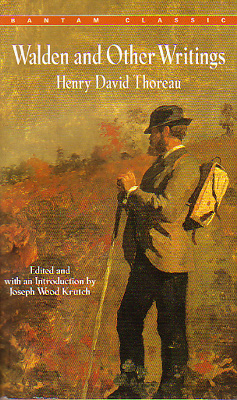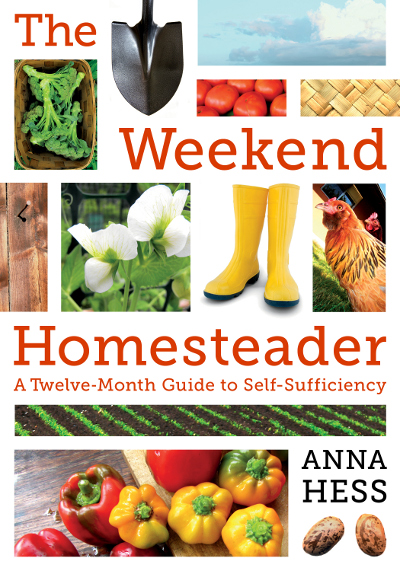
Dividing up your hours when you don't work
 Although
Thoreau (as usual) layered meaning upon meaning, the theme I found most
interesting in chapters 7 and 8 pertained to how Thoreau filled his
days when he had no external demands on his attention. I suspect
that many of our readers are working toward exactly that state, and I
know from experience that it's not as easy as it looks to be happy when
you're in charge of managing your own time.
Although
Thoreau (as usual) layered meaning upon meaning, the theme I found most
interesting in chapters 7 and 8 pertained to how Thoreau filled his
days when he had no external demands on his attention. I suspect
that many of our readers are working toward exactly that state, and I
know from experience that it's not as easy as it looks to be happy when
you're in charge of managing your own time.
I've noticed that most
people who enjoy this freedom (rather than fleeing from it) settle into
a routine, perhaps like the one that Helen and Scott
Nearing developed
--- four hours of physical labor, four hours of mental labor/artistic
expression/fun, and four hours of community work. The schedule
that has worked best for me and Mark is to work from nine to noon on
farm chores, from one to four on writing/chicken waterers, and from 4
until whenever on blog posts. We swap the indoor and outdoor time
periods in the winter, and spend an extra half hour before (me) or
after (Mark) the work day for chicken care and walking
Lucy.
Thoreau had his summer
routine as well. First, he hoed beans (his cash crop) from 5 am
until noon. As he chopped weeds, Thoreau watched birds,
dug up salamanders, ignored
the advice of neighboring farmers, and listened to festivities in the
nearby town. But, mostly, he revelled in the work itself:
Come noon, Thoreau
jumped in the pond, then did whatever he liked for the rest of the
day. I was surprised to read that his preferred activity every
day or two was walking into town --- maybe he wasn't an introvert after
all.
For those of you who
already get to plan your own days, what sort of schedule do you
choose? And for the avid readers (especially Sam), what
unmentioned part of these chapters jumped out at you?
If you're new to the book
club, you might want
to check out the  thought-provoking comments on
chapter
1, chapter
2, chapters
3 and 4, and chapters
5 and 6. We'll
be discussing chapter 9 (The ponds) and chapter 10 (Baker farm) next
Wednesday, and anyone is welcome to join in. I suspect that you
could jump right into the discussion without wading through the
difficult early chapters, so please don't let a late start deter you.
thought-provoking comments on
chapter
1, chapter
2, chapters
3 and 4, and chapters
5 and 6. We'll
be discussing chapter 9 (The ponds) and chapter 10 (Baker farm) next
Wednesday, and anyone is welcome to join in. I suspect that you
could jump right into the discussion without wading through the
difficult early chapters, so please don't let a late start deter you.
The
paperback edition of Weekend
Homesteader contains three bonus chapters not found in the ebooks,
two of which cover the relevant topics of setting homesteading goals
and learning to enjoy what you've got.
Want more in-depth information? Browse through our books.
Or explore more posts by date or by subject.
About us: Anna Hess and Mark Hamilton spent over a decade living self-sufficiently in the mountains of Virginia before moving north to start over from scratch in the foothills of Ohio. They've experimented with permaculture, no-till gardening, trailersteading, home-based microbusinesses and much more, writing about their adventures in both blogs and books.
Want to be notified when new comments are posted on this page? Click on the RSS button after you add a comment to subscribe to the comment feed, or simply check the box beside "email replies to me" while writing your comment.

I was most struck by the amount he actually planted and cultivated! At one point he says he never did hoe the whole beanfield. But that wasn't really a problem. His hoeing seemed to be the way he connected to the outdoors in a different way than his woods walks. He never tells of his feeling it is too hard! Overall, he seems very self-possessed (at least, in how he presents this side). Relaxed, and happy. Good for a solitary person. Not always possible for one who has other family pulls.
Mom --- I think it does make a huge difference if you don't have kids hanging on your coattails.
But I also think that Thoreau went into his adventure from a different point of view than you (and later, I) did. I think he had enough money to get by because of his family and was more into the philosophical adventure than really trying to feed himself. So, if half of his bean crop barely produced due to not being hoed, it was no big deal to him.
Right now I wake up, feed the dogs, help get Waylon dressed and fed, head off to work, sit in a chair staring at a computer screen for eight hours, go home, take over babsitting duties for awhile, help with household chores, collapse on the couch out of utter exhaustion and stress and the go to bed so I can do it all over again the next day. On weekends I frantically try to play catch-up on all of the outdoor work on the property that I was unable to get to during the week. Sunday night I drink several beers, watch a movie, read a book and prepare the the same week starting Monday morning.
I think my current schedule is indicative of anyone with kids and a mortgage.
If you want to live a life like Thoreau do yourself a favor and don't take on a mortgage, and don't have kids. If you've already done both of these things you'll just have to wait until you retire. Welcome to the American dream.
Everett --- Hang in there! In a few years, Waylon can be doing all your chores and you'll be able to sit with your feet up in front of the fire!
You did hit on Thoreau's main theme, though --- the fewer possessions you have, the more time you have.
Fostermamas --- I know what you mean. It feels like there are always scads of deadlines here on the farm! And we're always missing them too, like getting wood in the shed by the end of May so it's had the absolute bare minimum of six months to season before wood stove burning time starts....
(I love the way you sum up your job, by the way!)